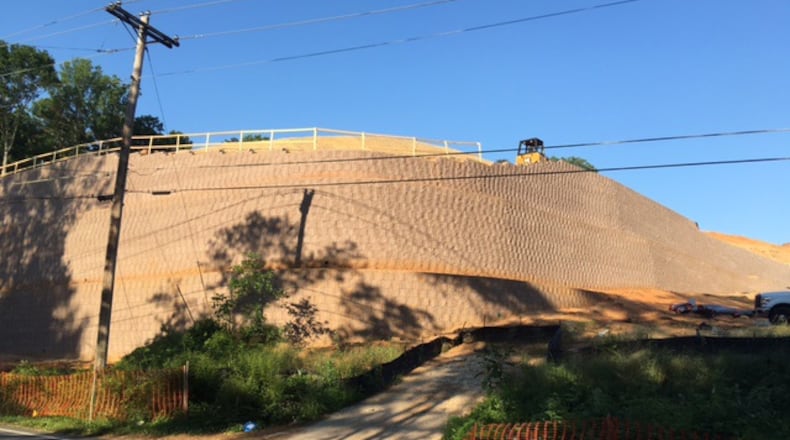If you've recently driven through the city of Roswell, chances are you've noticed the pink wall that's getting some residents all riled up.
Dubbed "the Great Wall of Roswell," by some city residents, the development on Coleman Road is a three-layer, 37-foot wall. Atop it, developers have planned to build houses.
"My wish," said Jeff White, a Roswell resident for the past 17 years, "is that not one single solitary home on top of the wall ever sells."
But it's not just that the wall is "ugly," White said. Residents also have concerns about how high the wall is built and the possible safety hazards — like flooding — that may ensue.
However, Mark Wolff, Roswell's deputy director of community development, told The Atlanta Journal-Constitution that the site was designed in accordance with applicable stormwater management requirements.
The wall is an unexpected result of a zoning change that was approved a few years ago, according to longtime resident Lance Polikov, an administrator of the Preserve Coleman Road Facebook page—a place where more than 250 concerned Roswell residents seeking to preserve the character of their city have been sharing their angry thoughts about the wall, he said.
In November 2014, a development team and a community of neighbors — including White — collaborated on a compromised plan that included a list of about 12 conditions that brought the community on board to support the zoning changes to come.
The wall, however, was never discussed, White said. But that's because the meeting was about rezoning, Wolff said. And the developer who owned the land at the time had sold his property.
Fast forward one year, and residents began noticing the retaining wall being built on Coleman Road, a street Polikov refers to as one of the "gateway[s] of Roswell." Coleman Road connects the communities between downtown Roswell and Marietta Highway near East Cobb.
The way the Unified Development Code (UDC) is written today, the new developer who purchased the land was able to make certain changes—like the building of the wall—to the original site plan without having to go through residents or city council, Polikov said.
According to Wolff, current UDC guidelines state that a request for any retaining wall—no matter the size—constitutes a minor site plan change and comes in as a building permit request. The request then goes to staffers in the building division who either approve or deny the request. Once the division has approved the request, which they did, he said, that's it.
With the current UDC guidelines, "it could've been a 100-foot wall and it'd still be considered a minor site plan change," Polikov said.
Residents expressed concern for changes to the current code to avoid future "eyesores" like the wall, Polikov said. So, the city called for a special work meeting at city hall on May 23.
At the meeting, Roswell city staff defended their decision to approve the wall, arguing that according to the current UDC guidelines, the staff legally did everything right.
Some proposals, including the need for formal city council approval for future retaining walls planned for 6 feet or higher and changes to UDC's current landscape buffer guidelines were discussed in the meeting.
Wolff said that several proposals presented at the May 23 meeting have already been implemented such as updating permit applications and checklists to identify features like retaining walls as early as possible in the planning process so that residents can be involved early on.
Other proposals like potential amendments to the UDC that affect location and height limits for retaining walls, Wolff said, are currently being refined and will be brought back to the mayor and City Council at the June 29 community development and transportation committee meeting.
But to the dismay of many Roswell residents, this wall's not going anywhere.
"There is presently no violation of the zoning or building code that would require the removal of the wall," Wolff said.
Both White and Polikov said this just adds to the mistrust the community already has with developers.
"This is a quiet, safe and nice neighborhood," White said. "And all they want to do is come in here and tear up our way of living to make money."
You can listen to the full audio from the May 23 session here.
About the Author
The Latest
Featured


